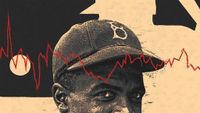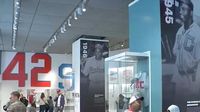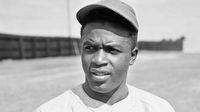HUDSON SQUARE, New York (WABC) -- April 15 is Jackie Robinson Day, marking the milestone in 1947 of Robinson breaking baseball's color barrier and joining the Brooklyn Dodgers. To celebrate the day, Major League Baseball stepped in and made admission free for anyone who visited the Jackie Robinson Museum in Manhattan's Hudson Square.
The baseball player's legacy is expansive, said Della Britton, president and CEO of the Jackie Robinson Foundation. "His legacy is not only that of being an incredible sportsman, his athletic prowess, but it's also an incredible citizen," Britton said. "A citizen of the world. A man who truly lived the notion of humanitarianism. A man who was concerned with equality on every front. He really did spend every day of his life thinking about how he could make the world a better place."
The museum, located on 75 Varick St., celebrates Robinson's commitment to social activism and civil rights. Those who visit the museum can learn all about his trailblazing life both on and off the field. The museum opened in September 2022 and continues to pay tribute to Robinson's legacy.
LOS ANGELES (AP) — Jackie Robinson’s legacy is being celebrated around the major leagues on Tuesday, with the day named for the first Black baseball player of the modern era and marking the 78th anniversary of his debut for the Brooklyn Dodgers. Robinson’s historic achievement preceded President Harry S. Truman’s desegregation of the military in 1948. Robinson served in the Army for two years before his pro baseball career.
He made a cultural impact not only through his success on the field. His character and his belief in nonviolence in the face of harassment by fans and racist attitudes among some of his fellow players won Robinson widespread respect and admiration. After his career ended, Robinson campaigned for civil rights, was active in politics and spoke out about baseball’s lack of minority managers and personnel at MLB headquarters.
“I’m not concerned with your liking or disliking me,” he said. “All I ask is that you respect me as a human being.”
On opening day this year, 6.2% of MLB players were Black, up from 6% in 2024 and the first year-over-year improvement since 2018, according to MLB.com. What is Jackie Robinson Day? It’s the day every year that Major League Baseball honors Robinson. His debut on April 15, 1947, ended 80 years of segregation in the sport. It’s celebrated at every major league park hosting games that day. It was first held in 2004.
Jack Roosevelt Robinson broke baseball’s color line when he started at first base for the Brooklyn Dodgers at the relatively advanced age of 28. Until the team signed him, Black players had been relegated to the Negro Leagues since the 1880s. Born in Georgia, Robinson grew up in Pasadena, California, where his family encountered racism and his brother, Mack, could only find work as a street sweeper after winning a silver medal behind Jesse Owens in the 200 meters at the 1936 Berlin Olympics.
Robinson participated in football, baseball, basketball and track at Pasadena Junior College and UCLA, where he became a star football player for the Bruins. Robinson’s name and likeness now adorn various sites around Pasadena, including the historic Rose Bowl. He played 10 years with the Dodgers, earning the Rookie of the Year award in 1947, was a six-time All-Star and became the first Black player to win National League Most Valuable Player award in 1949. He played in six World Series and contributed to the Dodgers’ 1955 championship team. He was inducted into baseball’s Hall of Fame in 1962, his first year of eligibility. Robinson died at age 53 of a heart attack in 1972. He’s buried at Cypress Hills Cemetery in Brooklyn.
A day that means more than just commemorating a baseball legend, it marked a turning point in the best baseball in the world. This Tuesday, April 15, the MLB honored the legend Jackie Robinson. Fans, players, and organizations celebrated the legacy of one of the most impactful players in baseball history. That's why Mike Trout couldn't miss the chance to share a heartfelt message. The MLB officially established April 15 as Jackie Robinson Day in 2004 to commemorate the day Robinson debuted with the Dodgers in 1947, breaking the league's color barrier.
To the strongest man to ever step on a diamond: thank you. It's always an honor to wear number 42. All MLB players and coaching staff wore Robinson's number 42 during Tuesday's games, and each team sported a Dodgers blue '42', regardless of the club's usual colors. Additionally, players wore Nike "Breaking Barriers" shirts during batting practice, and commemorative jewels were used on the bases and lineup cards in each game.
On Tuesday, all across the baseball world, Jackie Robinson Day commemorations took center stage. Since 2004, April 15 has been an obligatory notch on the baseball calendar, an opportunity for Major League Baseball to honor, to apologize and to force onto the viewing public a particular remembering of Robinson’s legacy. The back of every jersey featured Robinson’s iconic No. 42 in Dodger Blue. Stadium jumbotrons rolled dramatic tributes set to stirring music. Broadcasters waxed vague poetic about Robinson’s poise and courage in the face of vitriolic racism.
But there is a difference between stitching 42 onto hundreds of uniforms and a purposeful, powerful exhibition of Robinson’s story. Because beneath the sanitized public glorification of this American icon lies a darker, more uncomfortable truth — one that Major League Baseball opts to sidestep. The glory of Robinson’s tale and the part on which the league chooses to focus — the breaking of the sport’s color barrier — was made possible by the system that forbade Black athletes like him from playing in MLB.
Robinson’s impact extends beyond the diamond. Kareem Abdul-Jabbar, speaking at the Dodgers’ annual celebration of Jackie Robinson Day, emphasized the importance of Robinson’s legacy in today’s political climate. “Trump wants to get rid of DEI, and I think it’s just a ruse to discriminate,” Abdul-Jabbar said, highlighting the ongoing relevance of Robinson’s fight for equality.
Dodgers manager Dave Roberts expressed a similar sentiment, noting, “This is not a one-day situation. It’s Jackie Robinson’s day for breaking the color barrier. But this is like an everyday sort of mindset, appreciation.” Roberts lamented the lack of diversity among MLB managers, stating, “I think he would say we need to do better.”
As the day unfolded, MLB faced criticism for how it commemorated Robinson’s legacy amid current sociopolitical issues. The league’s annual press release detailing Jackie Robinson Day made no reference to the phrases “Black,” “racism,” nor “color barrier,” raising concerns about the authenticity of its tribute.
In late March, a story on the Department of Defense’s website about Robinson’s military service was removed as part of the Trump Administration’s efforts to scrub material involving diversity, equity, and inclusion but was swiftly revived after public outcry. This incident, along with the removal of DEI-related references from MLB’s website, underscores the ongoing struggle for recognition and representation in America.
As fans and players donned No. 42, the true essence of Jackie Robinson's legacy resonated. His story is one of resilience, bravery, and the relentless pursuit of equality, a narrative that remains crucial in today’s society. The MLB must not only celebrate Robinson’s achievements but also confront the uncomfortable truths of his journey and the ongoing fight for justice.









